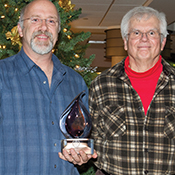Alum James Pommersheim Turns Passion for Teaching into Swanson School Annual Award
James M. Pommersheim professes a passion for teaching, and he can easily name standout faculty members at the University of Pittsburgh where he earned his bachelor’s, master’s, and doctoral degrees in chemical engineering. As a Pitt alumnus and a professor emeritus of chemical engineering at Bucknell University, Pommersheim hopes to put the spotlight on teaching excellence at Pitt. With that in mind, he returned to his alma mater last month to present the inaugural James Martin Pommersheim Award for Excellence in Teaching.
The genesis for the award came during a discussion that Pommersheim had with Steven Little, chair of Pitt’s Department of Chemical and Petroleum Engineering, who expressed interest in establishing an annual departmental award for excellence in teaching in Pommersheim’s honor. Pommersheim said that while he has donated regularly to the Swanson School, “I always felt that I might make a more substantial contribution to my home institution.”
genesis for the award came during a discussion that Pommersheim had with Steven Little, chair of Pitt’s Department of Chemical and Petroleum Engineering, who expressed interest in establishing an annual departmental award for excellence in teaching in Pommersheim’s honor. Pommersheim said that while he has donated regularly to the Swanson School, “I always felt that I might make a more substantial contribution to my home institution.”
Teaching! “That was the kisser. That was it,” he said of his reaction to Little’s proposal.
“Dr. Pommersheim follows the work of our faculty with great intensity, and I’m honored that we could recognize his generosity by establishing this award in his honor,” Little said. “The endowment he established for the department will positively impact our educational mission and greatly benefit our students and faculty.”
During a departmental holiday party on Dec. 18 at the Petersen Events Center, Pommersheim announced the first Pommersheim laureate: Robert Enick, NETL RUA Faculty Fellow, Bayer Professor and Vice Chair for Research within the Department of Chemical and Petroleum Engineering, Pitt’s Swanson School of Engineering. Enick received a $1,000 prize and trophy.
Little described Enick as “a selfless teacher in the department, consistently volunteering to teach more than the normal load for a faculty member.” Students in a recent senior Plant Design course—reputed to be one of the department’s tougher classes—gave him a 5 out of 5 in their instructor evaluations.
Pommersheim is delighted to have recognized a teacher who has impacted student learning. At Bucknell, Pommersheim led the development and implementation of an applied mathematics and modeling course, which is now taken by nearly all of the school’s chemical engineering majors. He also established and taught a series of courses on transport theory, a discipline that concerns the exchange of mass, energy, and momentum. During a recent lunch, he applied the transport theory to the dissolution of sugar in a glass of iced tea.
“My greatest strength as a teacher is my enthusiasm for the subject matter or problem at hand,” Pommersheim said. “It was a delight to see my students become critical problem solvers … Every problem presents a situation with new opportunities for learning because, as you learn, you open up new questions.”
This querying process continues, he said, until “you have either completely defined a small but general area of knowledge or you have reached a class of problems for which you cannot find answers.”
But this way lies madness if pushed to the extreme, Pommersheim said: “You might spend an entire semester on a single problem, and, of course, one knows not to do this. But if you keep this in mind, every now and again your contagion infects the students and they, too, become emboldened. This is a point where teaching and research can collide.”
One Pitt professor who infected a young Pommersheim with curiosity is the late Edward B. Stuart, former dean of the School of Engineering and head of the chemical engineering department. Stuart’s “great mass-transfer course” was an eye-opener for Pommersheim as an undergraduate. Then, as he moved into graduate work, Pommersheim found another side of the man who would become one of his mentors. “We shared a mutual interest in philosophy. I enjoyed the many discussions we had on subjects like the metaphysics of Plato and Aristotle. Later at Bucknell, as recipient of the Class of 1956 Award for Inspirational Teaching, I was required to give a general lecture to the university community on a topic of my choice. My talk was on modeling, a subject that lies at the cusp of physics, math, and philosophy. … After the talk a philosophy professor accused me of Neo-Platonism. Dr. Stuart would have been proud.”
In addition to his extensive teaching career, Pommersheim has served as a research associate for the National Institute of Standards and Technology, Occidental Research and Petroleum, Mobil Oil, and NASA. He provided consulting services for the Center for Building Technology, part of the National Institute of Standards and Technology, as well as for Pennsylvania State University’s Materials Research Institute. His research has been published in a number of academic journals and he has made presentations at national and international meetings.
But teaching remains the highlight of his career and his dedication became apparent during his graduate-school days at Pitt: even as a teaching assistant, he refused to let an exam he was giving on Oct. 13, 1960, be interrupted by the cheers emanating from Forbes Field when Bill Mazeroski hit his legendary Yankees-defeating World Series homer.
“Today, though, I’d have given them the day off,” he quipped.
Other Stories From This Issue
On the Freedom Road

Follow a group of Pitt students on the Returning to the Roots of Civil Rights bus tour, a nine-day, 2,300-mile journey crisscrossing five states.
Day 1: The Awakening
Day 2: Deep Impressions
Day 3: Music, Montgomery, and More
Day 4: Looking Back, Looking Forward
Day 5: Learning to Remember
Day 6: The Mountaintop
Day 7: Slavery and Beyond
Day 8: Lessons to Bring Home
Day 9: Final Lessons

